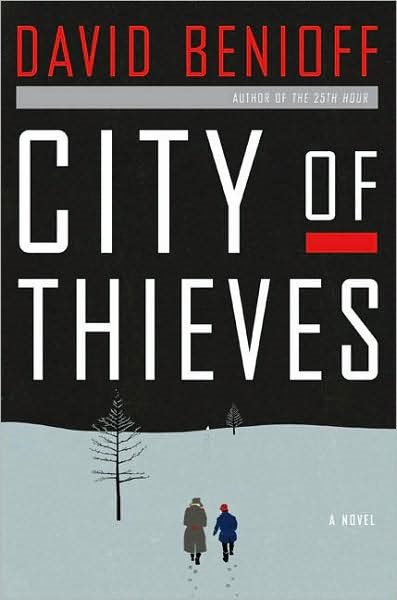City of Thieves by David Benioff

Reviewed by Cindi Di Marzo
A screwball comedy set in and around Leningrad during World War II might immediately call to mind Mel Brooks, but David Benioff’s latest novel, City of Thieves (Viking, 2009; Plume paperback, 2008), bears his own signature, as much as any of Brooks’s tragicomedies are marked by the great filmmaker’s fingerprint. The first-person account in Benioff’s creation comes from Russian-born, Florida retiree Lev Beniov, initiated by a request from his grandson, a screenwriter named David who could be modeled on the author. This unanswered question merely adds to the fantastic nature of Benioff’s tale, which straddles the border between gritty realism and fairy tale. After filling many cassette tapes with his reminiscences, Lev admits that there are details and loose ends in his story that do not make sense. And so, it is up to the writer, grandson David, to fill in the blanks, make the connections and draw meaning from death, destruction and despair.
Lev is the 17-year-old son of a Jewish poet taken away years ago by the secret police for what they declared to be subversive writings. Apparently one of the more benign free-thinking poets of the time, Lev’s father innocently referred to his native city as Piter, an abbreviated term of endearment used by residents of St. Petersburg (so named for a Czar’s patron saint), rather than the Soviet-approved Leningrad. It is winter 1942, and Leningrad is under siege from the Nazis. Lev’s mother and sister have been evacuated to the country, while he chooses to remain in their apartment, part of the civilian surveillance. An insecure, introspective teen given to lengthy self-examination, Lev wants to be a hero. He reads propaganda notices, knowing that his father would cut right through the rhetoric. He cannot reconcile his fear (which, from his own admission, is considerable) with his dream of becoming a courageous and daring protector of his city. When a dead Nazi is projected from a plane and lands near the apartment, Lev sees an opportunity to capture the enemy. He and other residents break curfew to investigate. Unfortunately, the enemy is already dead, and Lev and his friends decide to make the most of it. Surprised by police while they are looting, his companions escape. Lev is captured and thrown in jail with a Red Army deserter, 20-year-old Kolya, who becomes many things to Lev: antagonist, sidekick, mentor (particularly in the ways of women and love) and, ultimately, friend.
To save themselves, they are charged with an impossible task in war-torn Leningrad: find a dozen eggs to be used in a wedding cake. Whether the commander who offers them this loophole believes it possible that such eggs can be found, delivered and baked into his daughter’s cake is doubtful. Still, with the five days and 400 rubles given them, Lev and Kolya set off to accomplish the task, roaming through Leningrad and then, after a disappointing encounter with Darling, the Leningrad chicken, trying their luck in the surrounding countryside. Kolya is a tall, blonde and charming Cossack; immediately Lev feels diminished in his presence. Kolya’s opinions, particularly on literature and music–which Russian poets, novelists and composers are worth considering and which have become instruments of the Party–are at odds with Lev’s, and they spar much of time. Still, Lev comes to admire Kolya for the “pure and complete confidence of a man who has accepted his own heroic destiny.” Doubting himself, Lev grudgingly admires Kolya’s brazen (if miscalculated) bravery. Later in the novel, after witnessing much savage brutality and surviving many instances of almost certain death, Lev ponders the nature of fear and the rewards offered to those who cling to life:
“How could you fear anything more than death? Everything else offered moments of escape: a paralyzed man could still read Dickens; a man in the grips of dementia might have flashes of the most absurd beauty.”
The truth behind Kolya’s uniform and self-assurance is that, like Lev, he is an adolescent. Living through war ages and changes people; the Soviet government’s reign of terror erodes trust between neighbors and friends and makes thieves of inherently honest citizens. Still, these boys remain, essentially, innocent, and their very innocence gains them the narrowest of escapes. These anti-heroes do everything wrong, yet somehow they land on their feet, dazed and dirtier but still alive. Their credulous acceptance of their mission is absurd, but they are living through a dream. In one scene, for example, they escape a giant flesh-eating Russian and his wife down a flight of stairs that will spark images of Jack the giant killer racing down the beanstalk followed by his hulking nemesis.
Benioff’s debut novel, The 25th Hour (2001), a crime thriller set in New York, was adapted for film by Spike Lee. Released in 2002, the movie drew attention to the author for his engaging characters who, like Lev and Kolya, rack up bitter mistakes but tip the scales in their favor by being so lovably flawed. City of Thieves proves yet again that Benioff is a talented novelist with a screenwriter’s perception of dramatic possibility. A classic good versus truly evil face-off; vivid characterization through rapid-fire dialogue; irresistible tension propelling the action forward at breakneck speed; and a budding romance between Lev and an expert female sniper traveling with a band of partisans–all of the elements of popular film are here. With luck, readers will be able to reconnect with Lev and Kolya on the big screen as they race against time to save their lives, help free their country from the Nazis and, as Kolya hopes, dance at the wedding and eat some cake.












